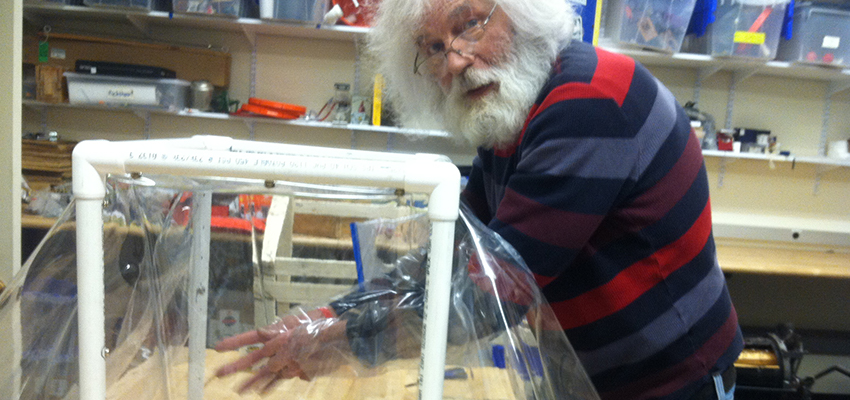
D-Lab research affiliate Debbie Lin Teodorescu, D-Lab special projects coordinator Dennis Nagle, D-Lab alumna Madeline Hickman, and David King of Massachusetts General Hospital have come together over the last several years to produce SurgiBox, which recently won an American Association for the Advancement of Science (AAAS) human rights poster competition, held in Washington, DC.
SurgiBox: safe, aseptic surgery where none was previously possible
Over 25 percent of the global disease burden requires surgical therapy, which could prevent over 18 million deaths per year. Yet two billion people have no access to surgical care, and two to three billion have access only to unsterile surgeries. Costly infectious complications strain countries' medical budgets.
The goal of the SurgiBox is to improve access to safe, aseptic surgery even in settings lacking standard surgical facilities, while making operating safer, more ergonomic, and less cumbersome for healthcare providers.
SurgiBox shrinks the problem of surgical sterility from operating-room-sized to less than one-fifth of a cubed meter. A user seals the system of sterile clear containers over the patient and operates via ports. Modules can augment the sterile field. An integrated ventilation system controls field conditions.
The device can collapse to backpack size for rapid deployment in emergency and remote settings. SurgiBox exemplifies how collaboration among engineering, medicine, and social sciences can help overcome resource and infrastructural barriers to implementing global surgery as a human right.
The SurgiBox story: exemplifying the way D-Lab brings people together
In 2011, while Debbie was at medical school, the original SurgiBox concept was born. The idea was to create a way to keep the area right around a wound sterile by covering it with a container and operating through ports. But she had no idea how to make it a reality. None of her medical colleagues had ideas either.
But Debbie had visited D-Lab a couple of years earlier and found it "an incredibly welcoming place." So, as she begain to toss the idea for SurgiBox around, Debbie contacted José Gomez-Marquez and Anna Young who made up the D-Lab Health team at the time, and they invited Debbie to work on the idea at the old D-Lab space on Carleton Street.
Debbie remembers, "They modestly said it could be a safe place for exploring, like one's own home garage - but I would definitely say that D-Lab is much better than any garage, because of the energetic community, the great hands-on teaching, and the makerspace setup."
D-Lab special projects coordinator Dennis Nagle got involved from very early on and has been an in-the-trenches supporter for SurgiBox throughout its development. In addition to teaching Debbie all about shop machines and materials including LEDs, and fans, and more, Dennis's expertise with plastics has been essential to the project's advancement. Together, Debbie and Dennis built prototypes and planned and ran tests side-by-side. Debbie says, "The SurgiBox Alpha Prototype (a tiny straw version) sits permanently on Dennis's desk because he helped drive the evolution of the original clunky box concept to a light drape/tent-like one."
In 2014, Maddie Hickman, then an MIT D-Lab student, joined the project and the team continue to move the project through successive prototypes. The current design embodies their ambitious goal: to offer a sterile surgical space that, when deployed, is as good as or better than that in any operating room in Boston, but can be collapsed for easy transport. It is, in essence, an operating room in a backpack.
Debbie says, "We are in the midst of testing and tweaking the design now. It was extremely gratifying to receive a lot of useful feedback at the AAAS Science and Human Rights Coalition conference, and be recognized for a what the judges described as 'very timely, creative project...on a critically important issue.'"
Pursuing a D-Lab-inspired joint degree in medicine and mechanical engineering When not working on SurgiBox, Debbie is finishing up an MD degree at Harvard Medical School with the support an AAUW fellowship recognizing her efforts in medicine and biomedical technology. She says that D-Lab inspired her to create the first joint MD/MEng degree at Harvard, completing the MEng component in biomedical engineering at Boston University in 2015. Prior to D-Lab, Debbie worked on low-cost diagnostic platforms and also on cost-effective ways to screen for individuals at exceptional risk of heart failure as well as sudden cardiac death. She is passionate about harnessing technology to solve patient care problems, and make the world a healthier place.
The SurgiBox team is grateful for funding from the Harvard Medical School Scholars in Medicine Office. The team also thanks Jose Gomez-Marquez and Anna Young for design and implementation advice; MIT D-Lab Workshop manager Jack Whipple for machine shop assistance; and Drs. Christiana Iyasere, Stephen Odom, and Dana Stearns for support. They also thank MIT’s Environmental Health Services, MIT Office of Technology Development, and Partners Research Ventures & Licensing for their support.

